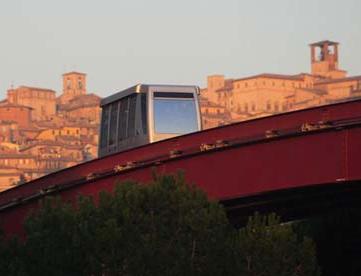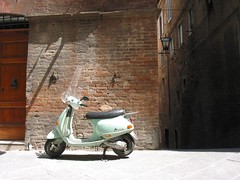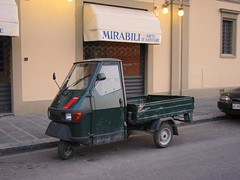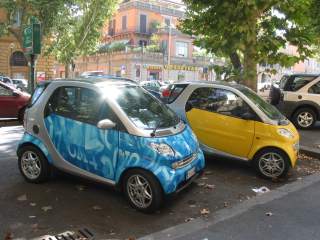The Null Device
Posts matching tags 'italy'
2013/6/25
Silvio Berlusconi's return to government suffered a setback yesterday when the former sultan of Italy was found guilty of paying for sex with an underaged prostitute and using his office to cover it up. The latter charge relates to an incident when the prostitute in question, Karima el-Mahroug or “Ruby the heart-stealer”, was arrested for theft, and Berlusconi called Milan's chief of police to get her off, saying that she was the daughter of the President of Egypt, and charging her with theft would have caused an international diplomatic incident. Berlusconi was sentenced to seven years in prison (which he will not serve, as Italy does not jail those aged over 70) and banned for life from holding public office. Berlusconi maintains his innocence, claiming (a) that he gave el-Mahroug money out of the goodness of his heart to get her off the streets, (b) that he sincerely believed that she was Hosni Mubarak's daughter (presumably reduced to theft and prostitution on the streets of Milan for some reason), and (c) that the charges were the result of an ongoing Communist conspiracy to destroy him and Italy.
The typical thing for il cavaliere, as he is known, to do would have been to get his allies in parliament to table a law retroactively legalising bunga-bunga parties, dropping the age of consent for prostitutes and changing the technical definitions of corruption in a way that would not apply to acting prime ministers; his party, the right-wing-populist People Of Liberty (PdL), is part of the governing coalition, and could in theory threaten to bring down the government if such a bill is not passed. Now, though, that may be harder to pull off, as the other parties are vehemently opposed to Berlusconi and everything that he stands for, and the accompanying assumption of such a tactic—that after a snap election, PdL would be better poised to govern in its own right or choose more pliant coalition partners to share power and its benefits with—might not stand if its leader is a convicted criminal.
The worst may be yet to come for Berlusconi, though; by the end of the year, Italy's supreme court will issue the final ruling in a tax fraud case concerning him.
2013/1/2
Benito Mussolini, the World War 2-era Italian fascist dictator, is enjoying a resurgence in popularity in Italy, and not just from the usual extremists either:
The decision by a town south of Rome to spend €127,000 (£100,000) of public funds this year on a tomb for Rodolfo Graziani, one of Mussolini's most blood-thirsty generals, was met with widespread indifference. Other more mundane examples include the leading businessman who proposed renaming Forli airport in Emilia Romagna – the region of northern Italy where the dictator was born – as Mussolini airport, or the headmaster in Ascoli Piceno who tried to hang a portrait of the dictator in his school.There are several explanations: some people are drawn to the idea of a populist strongman in the age of austerity, and compartmentalising all that unpleasantness with racial laws and deportations of Jews and such away from the cozy ideal of village post offices and a leader willing to bloody the noses of the elites in the name of the common man. Part of it is that, unlike in Germany, an admiration for fascism never completely left the sphere of acceptable opinion in Italy: a 1952 law forbidding fascist parties or the veneration of fascism has never been seriously enforced, and there are neo-fascist parties comprised not of shaven-headed thugs and football hooligans but of the kinds of reactionary though otherwise ordinary middle-aged and older people who, were they in Britain, would merely read the Daily Mail and grumble about how the world's going to hell. Though another likely cause in the rise of pro-fascist sentiment would be the dog-whistle politics of the Berlusconi era, in which many of the former pornocrat's close allies actively praised Mussolini and his ideals, and Berlusconi himself, whilst not explicitly doing so, did make light of Mussolini's suppression of dissent, and brought neo-fascists into his coalition:
"Today, Mussolini's racial laws against Jews remain an embarrassment, but people don't care about his hunting down anti-fascists," said Maria Laura Rodotà, a journalist at Italy's Corriere della Sera. "That became one of Berlusconi's jokes."
Admiration for Mussolini is common in Berlusconi's circle. Showbusiness agent Lele Mora, who is now on trial for allegedly pimping for the former prime minister, downloaded an Italian fascist song as his mobile ring tone, while Berlusconi's long-time friend, the senator Marcello Dell'Utri, has described Mussolini as an "extraordinary man of great culture".
2012/10/23
A report to an inquiry in Victoria has estimated that at least one in every 20 Catholic priests in the state is a child sex abuser, with the real figure being likely to be more like one in 15.
He suggested that, though the Church tried to "fudge the figures" by including other church workers, Catholic priests offended at a much higher rate than other men. If the general male population now over 65 offended at the same rate, there would be 65,614 men living in Australia who had been convicted of child sex abuse — very far from the case.The report, by Professor Des Cahill, also condemned the Catholic Church's institutional culture as “verging on the pathological”, and called for reforms to be externally imposed, including allowing married clergy.
"Bishops are caught between canon law and civil law, and Rome has put a lot of pressure on bishops to make sure canon law and the rights of priests are being observed, but canon law has nothing to say about the rights of child victims," he said. The Melbourne Response — the internal protocol used by the Melbourne archdiocese — was designed to protect the image and reputation of the church and to contain financial liability, and had to be changed. "The church is incapable of reform, so the state will have to do it," he said.Meanwhile, the Vatican is slightly closer to canonising the last emperor of the Austro-Hungarian Empire, Karl von Habsburg.
And an Italian court has jailed seven scientists for manslaughter for failing to predict the L'Aquila earthquake of 2009, after they stated that minor tremors recorded before the earthquake were “normal”. The sentence has attracted widespread condemnation.
2012/8/8
As Italy's economy flounders, Der Spiegel has a report on the different way of business and administration in Italy's south:
The politicians have proven particularly adept at finding public service jobs for their friends. Today, some 144,000 Sicilians get their salary from the state, and one in eight of them is the head of something or other. Many administrative offices are full of people who have no idea what they're supposed to be doing.
The mafia controls large parts of waste collection and the transport industry, trades in milk and cheese and builds roads under public contracts. The system of public tenders lends itself to all kinds of fraud. But it's not being changed. People who win a contract to build a section of motorway for €100 million sell it on for €90 million -- without lifting a finger. The buyers pass it on to a third company for €80 million. And so on. In the end, someone builds the actual road that should cost €100 million for just €10 million -- and the result looks correspondingly unsatisfactory.
A prime example of this is the A3 motorway from Salerno to the city of Reggio Calabria in southern Italy. Construction began in 1962, and almost every kilometer was built by a different firm. When the motorway was finally finished in 1974, there was -- surprise, surprise -- no emergency lane. After more than 20 years of debate, renovation work begain in 1997 and the A3 is now scheduled for completion in 2017. The estimated construction costs are 10 times greater than planned. There is no hint of national outrage or political consequences.Not all Italians are putting up with such commentary from the Germans (i.e., the ones left to pay the bill at the end of the night): Italy's disgraced former pornocrat, Silvio Berlusconi, is having his tabloids call the Germans Nazis, in between commenting unflatteringly on Chancellor Angela Merkel's appearance. (In Germany, you see, women politicians typically don't ascend to office from having worked as showgirls.) Perhaps he's hoping to reclaim an Italy kicked out of the EU as his personal fiefdom?
Meanwhile in France, a statue of former supermodel and First Lady Carla Bruni-Sarkozy has been installed in a Parisian suburb. The statue was commissioned before her husband, President Sarkozy was swept from power and disappeared from public view shortly after losing immunity from prosecution, and shortly before his home and two offices were raided by police:
The Sarkozys' decision to go to ground contrasts magnificently with the opulent lifestyle the once publicity obsessed pair showed off when they were in the Elysée Palace. Private jets with made-to-order bread stoves, daily fresh flower bills of more than €750, Vanity Fair cover shoots and even a CD release by the self-styled "rock chick" first lady were all part of a presidential package which so disgusted ordinary French people that they ended up replacing Sarkozy with the most overtly leftwing government for decades.
2012/1/29
Last week, The Guardian once again ran a series of articles on Europe today, with contributions from papers in France, Spain, Germany, Poland and Italy. Intended partly to combat the rise in anti-European sentiment in the wake of the financial crisis. Among other things, this includes a number of profiles of political leaders by journalists from other countries (i.e., an Italian perspective on Germany's Angela Merkel, a German view of Poland's Donald Tusk, and French and British pieces on the other country's leader), as well as a a section looking at, and responding to, national stereotypes in Europe:
What message do we Brits think we send when our signature cultural export of 2011 was Downton Abbey, a show entirely about the intricacies of class and which apparently longs for a return to Edwardian notions of hierarchy? The smash West End play One Man, Two Guvnors similarly revolves around class. Unfortunately, it's not just a foreigners' myth that in Britain how one speaks and what school one attended still counts.
There is a vibrancy to modern British life that eludes the cliche's grasp. There's a hint of it in that Polish suggestion that the Brits are "kind and friendly to immigrants". Compared with other European countries, it's probably true that Britain is, generally, more tolerant. Some of our public services – the NHS, the BBC – are still cherished. We are not merely a mini-America of let-it-rip free-marketism.
Efficiency is not really a Berlin thing. Take construction. To build 2km of new tram lines to connect the new central station, they set aside three years. Delays were not even factored in. In China, they'd have built whole new cities in that time, or a high-speed motorway across the entire country. Maybe the Chinese are the Germans of the 21st century. Or maybe Berliners are just not typical Germans. Can you stereotype a country if its capital is not typical?
In Italy, sex drive increases with age. Naturally, it is also possessed to a degree by the young (this is why we have children), but it is only after the age of 50 that the Italian male finally dives headlong into adolescence. We are the only nation to have had a prime minister in his 70s who wears a bandana on his head like a tennis player or a rap singer.
2010/4/29
Italian prosecutors have shut down a radio station after discovering that it was sending coded messages to Mafiosi via record requests:
Police listening in on a conversation between Pesce and his wife at Palmi jail in southern Italy heard him talking about record requests and concluded there was more to it than a love of music. According to a transcript leaked to the daily Il Giornale, Pesce told his wife, after scribbling down the name of a tune: "If it's positive you send me [this] song on the radio tonight. If it's negative you send me another."
2010/1/19
In Italy, the Berlusconi government is planning to introduce regulations requiring anyone uploading videos to the internet to obtain government approval. The government claims that the regulations (which can be passed without a vote) are an enactment of an EU directive on product placement; conveniently, they also outlaw a lot of competition to established media, such as, for example, the Mediaset group owned by the current Italian Prime Minister.
Article 4 of the decree specifies that the dissemination over the Internet "of moving pictures, whether or not accompanied by sound," requires ministerial authorization. Critics say it will therefore apply to the Web sites of newspapers, to IPTV and to mobile TV, obliging them to take on the same status as television broadcasters.The regulations follow an earlier attempt by the Italian government to regulate bloggers by subjecting them to the same rules as newspaper publishers. Italy also requires all users of internet access points to register their identity, under an "anti-terrorism and anti-paedophilia" law.
2009/12/24
There is growing speculation that the recent attack on embattled Italian PM Silvio Berlusconi was staged, to give his flagging popularity a sympathy boost and allow his allies to push through useful restrictions to civil liberties:
A video sequence posted on YouTube shows television footage in which Berlusconi immediately covers the lower part of his face with a black plastic bag after the attack and keeps it there while being bundled into a car with no blood visible.
The first video asks why Berlusconi emerged from the car a few minutes after the attack, showing his bloody face to the cameras, including a deep wound below his left eye which did not appear in the first images.
2009/12/19
In an attempt to fight pornography and disharmony on the internet, the Chinese government has banned individuals from registering personal domain names, and announced that those with personal websites might lose them. From now on, only licensed businesses will be able to own domain names in China.
Meanwhile, the Italian government is considering restricting criticism on the internet, after a violent assault on the prime minister, Silvio Berlusconi, which his party have argued was caused by "a climate of hate generated by virulent opposition criticism". Italy already requires anybody using internet access facilities to show and register identity documents, under the guise of fighting terrorism and paedophilia.
2009/9/16
Dispatches from the grim meathook present-day: the Calabrian mafia, which has for a long time made a lucrative sideline from the disposal of waste, has apparently muscled in on the business of nuclear waste disposal. Of course, being the Mob, they're able to offer economies honest operators cannot, by the simple expedient of packing ships with nuclear waste and blowing them up off the coasts of Italy and Greece. Up to 30 such ships may have been sunk.
2009/9/6
There's a new documentary which looks at how Italian president and media mogul Silvio Berlusconi has, over the past three decades, changed his country's culture, society and politics. Videocracy, by Swedish-based Italian filmmaker Erik Gandini, starts 30 years ago, when Berlusconi's channels started introducing gratuitous female nudity to mainstream programming, ramping up the amount of vacuous, vaguely pornographic titilliation, and culminating with their owner becoming president, twice. The film interviews a number of characters symbolic of the system, including a hapless, fame-hungry talent-show contestant, a fascist-sympathising media fixer, and a paparazzo and convicted extortionist turned celebrity. There are more details here, and (with a trailer) here.
Beginning with a young Berlusconi’s arrival on the commercial Italian TV scene three decades ago, the film opens with archive footage of a stripping housewife quiz show – proving that this Italian TV gem is not the urban legend some assume it to be – and segues into a montage of busty variety show starlets (one of whom is now minster for gender equality in Berlusconi’s government). Videocracy then introduces us to the three main characters whoare used as benchmarks for the moral madness that the director sees as being induced by the dumbed down world of Italian commerical TV.Videocracy is screening at the Venice and Toronto film festivals. Perhaps unsurprisingly, though, both Berlusconi's private TV channels and the Italian state broadcaster RAI have refused to run advertisements for it.
2009/2/3
Several Italian cities with right-wing governments are banning foreign restaurants. The initiatives are supported by the xenophobic right-wing Northern League, though undoubtedly got considerable moral support from Silvio Berlusconi's brand of culture-war tabloid conservatism:
Luca Zaia, the Minister of Agriculture and a member of the Northern League from the Veneto region, applauded the authorities in Lucca and Milan for cracking down on nonItalian food. “We stand for tradition and the safeguarding of our culture,” he said.
Asked if he had ever eaten a kebab, Mr Zaia said: “No – and I defy anyone to prove the contrary. I prefer the dishes of my native Veneto. I even refuse to eat pineapple.”The scary thing is that such wilful ignorance, rather than being regarded with pity or scorn, is lauded by many as a virtue.
Of course, the ban on foreign cuisine is not as cut-and-dry as it might seem; it's not all foreigners that are targeted, only those sinister dark-skinned ones from the east.
There is confusion, however, over what is meant by ethnic. Mr Di Grazia said that French restaurants would be allowed. He was unsure, though, about Sicilian cuisine. It is influenced by Arab cooking.
(via ithinkihaveacat) ¶ 2
2008/8/28
 An art gallery is considering whether to withdraw a sculpture of a crucified frog after Pope Benedict condemned it as blasphemous and the president of the regional government went on a hunger strike in protest. The sculpture, Zuerst die Füsse ("Feet First") by the late German artist Martin Kippenberger, depicts an anthropomorphic frog nailed to a cross, its tongue grotesquely lolling, holding a beer stein and an egg, and was intended by the artist as a self-portrait illustrating human angst.
An art gallery is considering whether to withdraw a sculpture of a crucified frog after Pope Benedict condemned it as blasphemous and the president of the regional government went on a hunger strike in protest. The sculpture, Zuerst die Füsse ("Feet First") by the late German artist Martin Kippenberger, depicts an anthropomorphic frog nailed to a cross, its tongue grotesquely lolling, holding a beer stein and an egg, and was intended by the artist as a self-portrait illustrating human angst.
I'm hoping that the gallery stands fast and doesn't remove it. What too many people are forgetting is that one has to choose to be offended by something, and not being offended is not a fundamental human right. If the president of Alto Adige chose to be so offended that he went on a hunger strike and was hospitalised, that was his choice. If we allow one religion to censor art to protect its sensitivities (or, indeed, its claim to cultural hegemony), it sets a terrible precedent.
2008/7/7
An argument has erupted between Italy's brusquely right-wing Prime Minister, Silvio Berlusconi, and archtitect Daniel Libeskind (best known for the Berlin Jewish Museum, New York's planned Freedom Tower and the Metropolitan University student union building in Holloway Road), after Berlusconi criticised Libeskind's design for a tower in Milan for not being straight enough, and emanating "a sense of impotence":
"In Fascist Italy, everything that was not 'straight' was considered 'perverse art'," said Libeskind. "My tower is inspired by the work of Leonardo da Vinci, and great Italian culture. [Mr Berlusconi] does not have the time or intellect to study these.
"As an American and Jew brought up in Poland, I find Berlusconi abominable. His concept of nationalism, of closing borders and denying what's different, is repugnant. He hates foreigners."Some are now speculating that Berlusconi will have planning permission for the project revoked. (Which suggests that in Italy, rule of law is sufficiently feeble to allow the prime minister to override local decision-makers out of pique.)
2008/6/14
2008/5/28
The mediæval Italian hilltop town of Perugia has inaugurated a new, incongruously futuristic, transport system:
 a light railway of pilotless, podlike cars, running from the valley to the centre of the old town:
a light railway of pilotless, podlike cars, running from the valley to the centre of the old town:
Dubbed the "Mini Metro", the rail line, which starts from the valley floor, climbs for 3km, wiggles around ancient constructions and monuments, and drops visitors off in the historic centre where an unobstructed view of Assisi and the rolling countryside gleams in the distance. Total travel time? 11 minutes.
At first look, the sight of pilot-less metallic pods shuttling people up and down the hillside on an elevated track seems, to put it mildly, anachronistic. Call it Tron-meets-Dante in the Umbrian hills.If the Mini Metro is successful, the Perugian municipal authorities plan to ban cars from the old town's narrow streets altogether.
2008/3/22
Italian police are looking for a man who apparently hypnotised supermarket staff into handing over money. The thief's exploits have been captured on CCTV:
In every case, the last thing staff reportedly remember is the thief leaning over and saying: "Look into my eyes", before finding the till empty.
2007/6/15
Apparently the Mafia used a radio station in Naples to send instructions to hitmen encoded in song requests.
2006/12/12
After Italy saw a spate of gruesome murders carried out by self-professed Satanists (who, apparently, indulge in "a lethal blend of black magic, hard drugs, sex and heavy metal"), the Italian police are planning to set up a "Satan squad". The special task force will include psychologists and a priest and will investigate "potentially dangerous religious movements". Some are concerned, though, that such a squad would become a hammer of Catholic majoritarianism and persecute harmless minority religions.
2006/11/14
Italy's usually efficient railways have been experiencing increased delays due to soaring copper prices, which have inspired thieves to steal signalling cables for sale as scrap:
Police say they have arrested 22 people in the past month alone on charges of stealing copper wire. Many of the accused have been identified as Romanian immigrants.
In Naples, police recently seized dozens of sea containers filled with stolen copper coils parked in the port area ready for shipment to China.Similar thefts have hit the Channel Tunnel Rail Link project in London, and theft of copper cables was responsible for at least one fatal crash in China. Which makes one wonder whether the plague of "signal failures" on the Tube (such as the one that crippled the Victoria Line this morning) has anything to do with this.
2006/11/8
Police in Italy have seized a toilet which plays the Italian national anthem when flushed from the Bolzano Museum of Modern Art. A court will now decide whether the museum is guilty of causing offence to the nation; the case for the prosecution is strengthened by a decree by the authoritarian Berlusconi government earlier this year defining the national anthem as an emblem and the property of the state.
2006/6/21
I'm back in London now, having spent the past five days on the continent, catching the Eurostar to Paris, then travelling via Zürich to Tuscany, staying for a few days in the mediaeval hilltop town of Cetona, then back to Paris via Florence and back to London. Photos from my travels will gradually filter onto Flickr.
Some observations:
- The Eurostar train to Paris was delayed by 80 minutes; it seems that the tunnel wasn't feeling well or something, and the train had to wait outside whilst its handlers coaxed it into cooperating. Consequently, I missed my initial connection, the 19:06 sleeper to Florence, despite a white-knuckle taxi ride through the Parisian rush-hour traffic. The moral of this story: allow more than one hour and 40 minutes between the Eurostar and anything departing from Gare de Bercy.
- I did manage to get a bunk on a later sleeper to Zürich, and a connecting train to Milan. The Zürich train (a French SNCF service) was relatively empty, and even in second class, quite comfortable.
- The Swiss love their sans serif typefaces and clean design, and have some of the best-looking banknotes I have seen. They're about as colourful as Australian banknotes, only with more of a modernist European graphic-design feel.
- The journey through the Swiss Alps from Zürich to Milan is probably the most scenic railway journey I have been on; the train climbs into the alps, winding around hills and going through tunnels, passing vast, mirror-still lakes and small towns. Then it goes through a tunnel near St. Gotthard's Pass, and comes out in the Italian-speaking part of Switzerland, which has a completely different climate, geography, architecture and character, seeming rather Mediterranean. I have added Switzerland to the list of places to visit.
- Swiss trains are very clean and run like clockwork. Italian trains are generally of a high standard. The "EuroStar Italia" trains (which are similar to French TGVs or Virgin Pendolinos) are fast and come with an onboard magazine (in Italian) and radio channels in the seats (which didn't seem to be working), and the "InterCity" trains (expresses pulled by more conventional electric locomotives; virtually all railways in Europe are electric these days) are air conditioned and clean. First class on those costs slightly more than second-class and gives you larger-looking seats (though they have the same number of them in the compartments) and power points near the window seats. (The EuroStar to Paris also had power points (European ones, not British ones), though the returning one didn't.)
- The "Palatino" sleeper from Florence to Paris is quite popular, and consequently the compartment I was in was full. Fitting into a second-class sleeper compartment (which holds six) with baggage is a bit of a juggling act. Apparently first class sleepers are said to be much more comfortable.
- Most if not all of the native English speakers one meets whilst travelling on trains through Europe are Americans. I wonder why this is; perhaps it's because Britons associate trains with day-to-day drudgery and avoid them whilst on holidays, whereas Americans regard them as part of the European experience.
2006/4/20
 This month, the Vespa motorscooter is 60 years old. It was created in 1946 by the Piaggio company, looking to transition from the suddenly less lucrative military-aviation market, and hitting upon tapping a market for cheap, convenient personal transport. As austeriry ended and consumers acquired more disposable income, it became a hit in Italy and abroad, and became an icon of freedom and youth culture (becoming to European kids roughly what Dad's Cadillac was to the rising American teens, only with the attendant European je ne sais quoi), and later of retro style.
This month, the Vespa motorscooter is 60 years old. It was created in 1946 by the Piaggio company, looking to transition from the suddenly less lucrative military-aviation market, and hitting upon tapping a market for cheap, convenient personal transport. As austeriry ended and consumers acquired more disposable income, it became a hit in Italy and abroad, and became an icon of freedom and youth culture (becoming to European kids roughly what Dad's Cadillac was to the rising American teens, only with the attendant European je ne sais quoi), and later of retro style.
 Piaggio, the Vespa's manufacturer, also made a line of miniature scooter-trucks, ideally adapted for narrow Italian town streets that had in the past been trod by donkey carts or similar; occasionally one sees one outside of Italy (I once saw one in West London; the poor thing must have gotten terribly lost), though they don't seem to have caught on in a big way there. It could be argued that post-war Italy had a two-stroke engine-led recovery.
Piaggio, the Vespa's manufacturer, also made a line of miniature scooter-trucks, ideally adapted for narrow Italian town streets that had in the past been trod by donkey carts or similar; occasionally one sees one outside of Italy (I once saw one in West London; the poor thing must have gotten terribly lost), though they don't seem to have caught on in a big way there. It could be argued that post-war Italy had a two-stroke engine-led recovery.
As revolutionary as compact, stylish-looking and affordable scooters were in the post-war years, they can't help but look a bit dated. They're noisy, bulky, relatively inefficient (technology having moved on since then), and consume Saudi Arabia's Finest, which probably isn't going to get any cheaper. Though Piaggio are now testing a hybrid Vespa in Milan; the new model can run off either petrol or electricity, much like a Prius, or can be plugged into the mains if you'd prefer to give the House of Saud the finger. The "electric-only" mode is still said to be slower than the petrol-powered mode, though one presumably doesn't buy a scooter for raw power.
2006/3/30
A recent issue of The Times has a fairly detailed section on rail travel today; this section includes a survey of the state of European rail travel (summary: it's enjoying a renaissance, thanks to Eurostar and environmental consciousness, likely to improve further when cheap flights dry up, though ticketing still has some way to go before booking international rail journeys is as easy as booking flights), a section on travelling across Europe on Inter-Rail passes (along with four recommended European rail journeys to make with one's pass), as well as articles on train travel in Italy and India, shinkansen journeys in Japan, the backpacker-infested Trans-Siberian Express (whose 1-week journey time, the previous article notes, could be slashed to 18 hours if it was rebuilt using maglev technology soon to be deployed in Japan), as well as various luxury train journeys, such as the current holder of the "Orient Express" trademark (an opulent art-deco train journey from London to Verona), the Canadian Rockies and opulent Hungarian luxury trains. Also, Australia's Adelaide-Darwin rail link gets a writeup, getting rather mixed reviews (apparently the "Darwin" terminus 18km from the city centre is an afterthought, the carriages aren't quite as luxurious as one would believe, and the ride is bumpy; not to mention the fact that, catering only to tourists (it's too expensive for casual commuters) and having no stations along the way, it's "not quite a proper train" compared to others).
For anyone wanting more information on rail travel in various parts of the world, there's always The Man In Seat Sixty-One, a (somewhat UK-centric) one-stop information shop for rail buffs and travellers with an aversion to air travel.
2005/12/22
Italian Prime Minister and media tycoon Silvio Berlusconi has made statements defending a footballer, facing criticism for using the Fascist salute as "a bit of a show-off". That, in itself, is not particularly shocking for a conservative politician; however, he followed it up with a defense of the legitimacy of Fascism:
"Fascism in Italy was never a criminal doctrine. There were the racial laws, horrible, but because one wanted to win the war with Hitler," Mr Berlusconi told foreign journalists.Of course, given that Berlusconi has near-total control of Italy's television (owning the largest private TV network and controlling state-run TV, which, presumably, is not funded by a BBC-style license fee), he stands a chance of getting away with it and winning the next election (which he is confidently boasting that he will).
2005/11/24
In January 1998, two teenage death-metal fans in Milan disappeared after drinking at a pub popular with the local metalheads. The father of one of them started making inquiries at concerts and festivals, and uncovers a Satanist death cult in the metal scene, one which has been linked to a number of murders (mostly of other teenage headbangers, by the sound of it):
One of Fabio's school friends, Mario Maccione, confessed to having beaten Fabio to death with a hammer. He also revealed that the boys had been part of a wider satanic sect called the Beasts of Satan. It was revealed Andrea Bontade, a drummer, had been terrorised into committing suicide. Soon, other mysterious deaths were being linked to the Beasts.
2005/9/29
From this week, anybody wishing to use an internet cafe or public telephone or fax machine in Berlusconi's Italy will have to produce their passport or identity papers. Furthermore, the managers of internet cafes and communications centres will be obliged to keep records of the times customers enter and leave the premises and which computers or telephones they use.
2005/8/5
Scientists have found that the River Po in northern Italy is full of cocaine residue; or, more precisely, of benzoylecgonine, a chemical produced only by metabolising cocaine and eliminated in urine. According to this test, people around the Po valley consume one and a half metric tonnes of cocaine a year, three times as much as official estimates suggested.
In other related news: cocaine traces found at EU parliament.
2005/7/26
No, this blog isn't dead; Your Humble Narrator was away in Italy for the weekend, with limited internet access. On Thursday, I managed to dodge suicide bombers to get to the airport in time for the plane. Friday and part of Saturday I spent in Florence, managing to take quite a few photos (btw, that Hemingway chocolate place is as good as Cory says it is; particularly the Montezuma). I also visited a few other places; more photos to be posted.
Btw, seen on one of those scooter-trucks belonging to a maintenance firm in Florence:
2005/6/6
A court in Sicily has overturned a decision by road authorities who suspended a man's driving licence because he was gay:
In a written ruling released on Monday, the Sicilian court said: "It is clear that sexual preferences do not in any way influence a person's ability to drive motor cars safely."
The judges added that homosexuality "cannot be considered a true and proper psychiatric illness, being a mere personality disturbance".
Homosexuality is legal in Italy, but openly anti-gay comments from politicians and officials rarely cause a stir.
(via ![]() substitute) ¶ 0
substitute) ¶ 0
2005/1/5
A gallery in London is staging an exhibition of Italian late-futurist "aeropainting", vaguely Art Deco-ish paintings of bombers on missions and such from Mussolini's Italy. The Ettorick Collection are downplaying the fascist subtext of the images, though that hasn't gotten past the appalled Guardian columnist, who also suggests that the Berlusconi government's backing of such an exhibition may be part of an attempt to rehabilitate Mussolini, and/or a fascist streak in the right-wing Italian government.
Tato painted this piece of fascist crap in 1937. Does the date ring a bell? It was on April 26 1937 that the Condor Legion of the German Luftwaffe, in support of General Franco's war against the Spanish Republic, bombed the Basque capital Guernica, on a market day, killing 1,654 people out of a population of 7,000. Pablo Picasso began Guernica after he read about this new chapter in the story of human cruelty. It seems plausible that Tato's painting Aerial Mission refers to the same events. For more than half a century Picasso's Guernica has preserved the memory of a town torn to pieces by aerial bombing. Now, at last, Futurist Skies gives us the other point of view: that of the murderer in the cockpit.
Futurist Skies is not a joke. It is not a parody but an example of the moronic complacency of the art world. And it really does have the support of the Italian state. Silvio Berlusconi's government has meanly and destructively starved museums of cash. But the director of the Estorick Collection warmly thanks the Italian foreign ministry for its "commitment" and "support" for this exhibition of meretricious art from the golden age of Il Duce. At least it's good to know where the Berlusconi government's cultural priorities lie. Claiming "aeropainting" as a major 20th-century art amounts to rehabilitating fascist kitsch.
And, for reference, Flying and the Fascist Aesthetic, a screed from USENET a decade or so ago, making a connection between the two subjects:
Why is flying inherently fascist? Because it exploits man's drive to put himself *above* the masses, as if the masses were some sort of disease that needs to be expurged from the soul. Flight becomes partly a search for clarity [of the sort that fascist movements purport to offer], partly a quest to raise the spectre of patriarchic hegemony to new, unfounded heights. Here there are many parallels to Hitler. Everything in Hitler's speeches built on the idea of "purity", "room for living", etc. So it is no doubt that some parallels may rise to the surface, once that surface is scratched.
2004/9/3

Apparently, the Italian/European name for Twisties is "Fonzies". Perhaps the Happy Days trademark wasn't valid there, or perhaps it has to do with the Italian infatuation with post-war US pop culture.

A graffito seen on two adjacent payphones along Via Nazionale. Either the gigolo culture is alive and well, or someone wishes it was.

A rather unfortunately named brand of calculator, for which there are ads all over Rome. Apparently they make mobile phones too, which promises even more possibilities for poor taste.

Seen in fashion shop windows.
As I mentioned before, the Italians seem to be rather fond of American pop culture, at least of the post-WW2 variety. Where the French are muttering darkly about McDonalds, the Italians openly embrace Coca-Cola (which is more popular here than in Australia, it seems), Disney and the like. The image to the left, a montage of three rather retro icons of American consumer culture, was seen in an Italian café. Elsewhere, you find Disney icons everywhere. Near the Colosseum, a street vendor was selling Mickey-and-Minnie-Mouse puppets which danced to music. The music in question was a rather tinny Eurodance loop, which cqame out of a boom box; for a moment, though, I thought that the embracing-Mickey-and-Minnies were fitted with a chip that plays Eurodance as they move, which would have been even more postmodern.

Another thing the Italians are into is small motor vehicles. Those 2-seater Smart microcars are everywhere here, and seem to be quite the fashionable way to get around. And, of course, there are motorscooters everywhere, ranging from ancient Vespas in various states of decrepitude to shiny new models, both Italian and Japanese.
2003/5/18
The street finds its own uses for things; those camera-equipped mobile phones, for example, are ideal for vote-rigging, as the Italian Mafia have discovered:
Here's the idea: you promise a voter 50 euros (31 pounds) to cast their ballot for your candidate, send them into the booth with a 3G phone, they send a picture via the phone proving that they have voted as instructed and then they get the cash.
(via bOING bOING)
2002/1/21
First there was the Kazakhstan hobbit crackdown, and now, Italian neo-fascists are getting really into Tolkien, running "Hobbit Camps" for young fascists. What's going on?
For the fortysomethings of Alleanza Nazionale (AN), the right-wing party in government, J R R Tolkien and his cast of elves and hobbits are as much a part of their political property as Che Guevara was for the left-wing. So much so that AN members of parliament and sympathisers held their own private première of the film.
2000/11/21
Life imitates an Italo Calvino story: An Italian man, burned out from his work at a hospital, has abandoned the rat race of terrestrial life and taken to living in trees.
Mollo spends his days bare-chested, playing a harmonica and lives by foraging for berries, nuts, mushrooms and wild greens which grow in the park in the Villa Borghese. He wears torn green trousers, bandanna, trainers and a mossy complexion. He says the trees give him power and keep him young.

